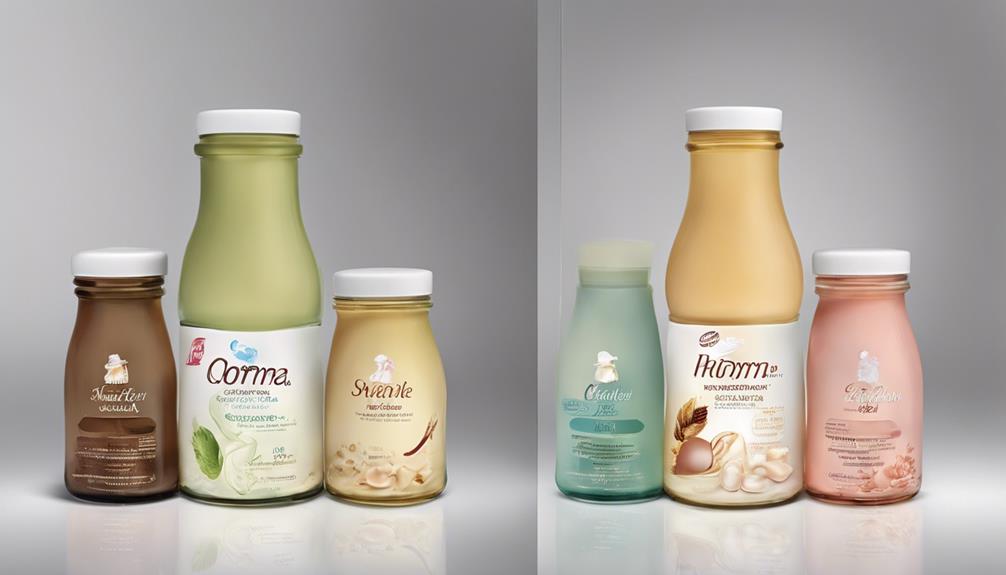Embarking on the discussion surrounding the merits of breastfeeding versus formula feeding is like navigating a river that twists and turns, offering up different currents and destinations.
The complexities of this decision often leave many pondering which path to choose for the best nourishment and well-being of their little ones. By delving into the nuances of each feeding method, we uncover a wealth of considerations that can shape the health and development of both infants and mothers.
So, let's set out on this informative expedition together, unraveling the intricacies that underlie the choices between breastfeeding and formula feeding.
Key Takeaways
- Breast milk provides superior immune protection and brain development support.
- Supplementing with formula and seeking lactation support can overcome breastfeeding challenges.
- Breastfeeding significantly reduces risks of infections, SIDS, obesity, and diabetes.
- Supporting informed feeding decisions empowers parents for long-term health benefits.

My Brest Friend Nursing Pillow – Deluxe – Enhanced Comfort w/ Slipcover – Ergonomic Breastfeeding Pillow For Ultimate Support For Mom & Baby – Adjustable Pillow W/ Handy Side Pocket, Soft Rose
ERGONOMIC DESIGN: Elevate your nursing journey with our unique nursing pillow. The wrap-around feature ensures ideal positioning &…
As an affiliate, we earn on qualifying purchases.
As an affiliate, we earn on qualifying purchases.
Benefits of Breastfeeding Vs. Formula Feeding
When deciding between breastfeeding and formula feeding, it's important to weigh the significant benefits that breastfeeding provides over formula feeding. Breast milk, often referred to as liquid gold, isn't just food; it's a powerful elixir that bestows countless health benefits upon our babies. The antibodies present in breast milk act as a shield, boosting the baby's immune system and providing protection against infections, SIDS, and allergies. Additionally, breast milk contains essential nutrients that support brain development and overall health in infants. Formula, while a practical alternative, can't replicate the unique composition of breast milk.
Feeding our little ones with breast milk not only nourishes their bodies but also nurtures a deep bond between mother and child. Studies have shown that breastfeeding can reduce the mother's risk of diseases like breast cancer and diabetes. Choosing breastfeeding sets the stage for a healthier start in life for our babies, offering a myriad of benefits that extend far beyond just nutrition.

Dr. Brown's Baby Formula Dispenser with Snap-On Lid for On-the-Go Feedings,Milk Powder Dispenser for Traveling with Infant,Gray
PORTABLE FORMULA CONTAINER. Compact and travel-friendly making it easy to bring pre-measured servings of formula wherever you and…
As an affiliate, we earn on qualifying purchases.
As an affiliate, we earn on qualifying purchases.
Nutritional Comparison: Breast Milk Vs. Formula

As we explore the nutritional aspect of feeding options for infants, it's important to compare the unique composition of breast milk and formula to understand their distinct benefits for a baby's health and development.
Baby breast milk provides essential antibodies that shield against infections and diseases, a component lacking in formula. Breast milk also aids in easier digestion, reducing the likelihood of digestive issues such as constipation and gas often seen in formula-fed infants.
Additionally, breast milk adapts its composition to meet the evolving nutritional needs of the baby, a feature absent in formula feeding. When it comes to brain development, breast milk takes the lead by offering essential essential fatty acids essential for cognitive function. In contrast, formula lacks live cells, enzymes, and hormones present in breast milk, elements that contribute to the baby's overall health and development.
Opting to breastfeed can provide a significant nutritional advantage for your baby's growth and well-being.

Hands-Free Wearable Electric Breast Pump, 3 Modes &15 Levels,320mmHg Strong Suction,Double-Sealed Leak-Proof Flange for Baby-Like Comfort,18/20/22/24mm Adjustable Flange, Pink 2-Pack Breast Pump Set
【3 Modes & 15 Suction Levels for Personalized Pumping】Designed with 3 intelligent modes—Massage, Stimulation, and Expression—to mimic natural…
As an affiliate, we earn on qualifying purchases.
As an affiliate, we earn on qualifying purchases.
Overcoming Challenges in Infant Feeding
Facing challenges in infant feeding can be overwhelming, but with the right support and resources, solutions can be found to guarantee your baby's well-being. When encountering difficulties in feeding your baby, remember that you aren't alone. Here are some strategies to help you navigate through these challenges:
- Lactation Consultants: These professionals are trained to assist you in overcoming breastfeeding challenges and provide valuable guidance and support.
- Supplementing with Formula: Consider this option to address feeding difficulties and make sure your baby receives the necessary nutrition.
- Benefits of Breast Milk: Even small amounts of breast milk offer essential benefits for your baby's health and development.
Remember that addressing feeding issues promptly is essential to support your baby's growth and well-being. Whether it's pumping breast milk to maintain your milk supply or seeking help from lactation consultants, know that there are resources available to help you overcome these obstacles.

Dr. Brown's Natural Flow Anti-Colic Options+ Narrow Baby Bottle, 4 oz/120 mL, with Level 1 Slow Flow Nipple, 0m+, 4 Pack
ANTI-COLIC BABY BOTTLE. Anti-Colic internal vent system is clinically proven to reduce colic. Decreases spit-up, burping and gas.
As an affiliate, we earn on qualifying purchases.
As an affiliate, we earn on qualifying purchases.
Health Implications of Breastfeeding Choices

Considering the health benefits associated with breastfeeding, making informed choices in infant feeding is important for promoting your baby's well-being.
Breastfeeding plays a critical role in reducing the risk of sudden infant death syndrome (SIDS) by 50% compared to formula feeding. Additionally, breastfed babies have a 72% lower risk of hospitalization for lower respiratory tract infections, while formula-fed infants are 2.8 times more likely to be hospitalized for gastrointestinal infections.
Moreover, breastfeeding lowers the risk of childhood obesity, type 2 diabetes, and certain childhood cancers. It's worth noting that breastfeeding for at least 6 months can reduce the risk of ear infections by up to 50%.
These health implications highlight the importance of considering breastfeeding as a beneficial choice for your baby's overall health and well-being. Making an informed decision regarding infant feeding methods can positively impact your child's future health outcomes, providing them with a strong foundation for a healthy life ahead.
Supporting Infant Feeding Decisions
Moving from the discussion on the health implications of breastfeeding choices, it's important to recognize the significance of supporting parents in their infant feeding decisions.
- Seeking guidance from lactation consultants can be immensely helpful in guiding breastfeeding challenges.
- Even small amounts of breast milk offer substantial benefits to babies, promoting their immune system development and fostering bonding.
- Supplementing with formula is a valid option for infant feeding, especially in cases where medical reasons may prevent mothers from breastfeeding, necessitating alternative feeding options.
It's vital to create a supportive environment where parents feel empowered to make the best feeding choices for their little ones. Understanding that each family's journey is unique, offering non-judgmental support and access to resources can make a world of difference in helping parents feel confident and informed in their infant feeding decisions.
Frequently Asked Questions
How Do I Know if I Should Breastfeed or Formula Feed?
It can be challenging deciding between breastfeeding or formula feeding. Consult with healthcare providers for personalized advice. Consider lifestyle, health, and preferences. Prioritize what's best for both you and your baby.
What Are the Main Differences Between Breast Milk and Formula?
We've found that breast milk, a dynamic blend of antibodies and nutrients, adapts to a baby's changing needs, promoting easier digestion and immune support. In comparison, formula, a consistent but processed alternative, may lack some bioactive components.
Which Is Healthier Breastfeeding or Formula?
Breastfeeding is healthier than formula feeding. It boosts baby's immunity, reduces infections, allergies, SIDS risk, and promotes bonding. Breast milk is easily digested, decreasing digestive issues. Long-term benefits include lower maternal disease risks.
Are Babies Happier on Formula Than Breast Milk?
Babies are not necessarily happier on formula than breast milk. Breastfeeding offers benefits like oxytocin release, natural sedatives, and responsive feeding, promoting calmness, bonding, and contentment. Each baby is unique, and finding what works best for them is key.
– Can I Breastfeed While Taking Mucinex?
Yes, it is generally safe to breastfeed while taking Mucinex. The active ingredient, guaifenesin, is not known to have any negative effects on breastfeeding infants. However, it’s always best to consult with a healthcare professional to ensure the mucinex and breastfeeding safety for you and your baby.
Conclusion
In the journey of feeding our little ones, we navigate through the nourishing benefits of breast milk and the convenience of formula. It's like choosing between a warm hug from nature and a reliable helping hand.
Whichever path we take, let's remember that the most important thing is the health and happiness of our babies. Trust your instincts, seek support when needed, and cherish the moments of bonding and nourishment.
You're doing great, mama.









